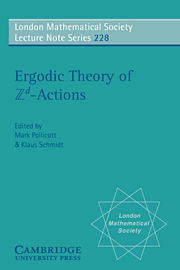Book contents
Introduction
Published online by Cambridge University Press: 30 March 2010
Summary
These notes represent the proceedings of the Warwick Symposium on ‘Ergodic Theory of ℤd-actions’ in 1993–94.
The classical theory of dynamical systems has tended to concentrate on ℤ-actions or ℝ-actions (i.e. discrete or continuous ‘time evolutions’). However, in recent years there has been considerable progress in the study of higher dimensional actions (i.e. actions of ℤd or ℝd with d > 1). This progress was motivated not only by statistical physics, but also by the remarkable successes of multiple recurrence arguments in certain number theoretic problems, and by the intriguing rigidity properties of some classes of ‘geometric’ and ‘algebraic’ ℤd-actions.
Historically, much of the interest in ℤd-actions came from the study of classical lattice gas models (for example, the famous Ising model). In the simplest case where d = 1 (i.e. in the case of ℤ-actions) this led to the development of the thermodynamic approach to the ergodic theory of Anosov and Axiom A systems during the 1960s and 1970s (cf. D. Ruelle's monograph Thermodynamical Formalism). By contrast, the corresponding problems of understanding the ergodic theory of even the simplest higher rank actions leads quickly to deep unsolved problems (for example, Furstenberg's conjecture on the invariant measures for ×2 and ×3 on the unit interval, or the undecidability problems associated with higher dimensional shifts of finite type). In the context of statistical mechanics, one of the manifestations of this difference between d = 1 and d > 1 is the existence of very complicated phase transitions in higher dimensions.
- Type
- Chapter
- Information
- Ergodic Theory and Zd Actions , pp. vii - viiiPublisher: Cambridge University PressPrint publication year: 1996



